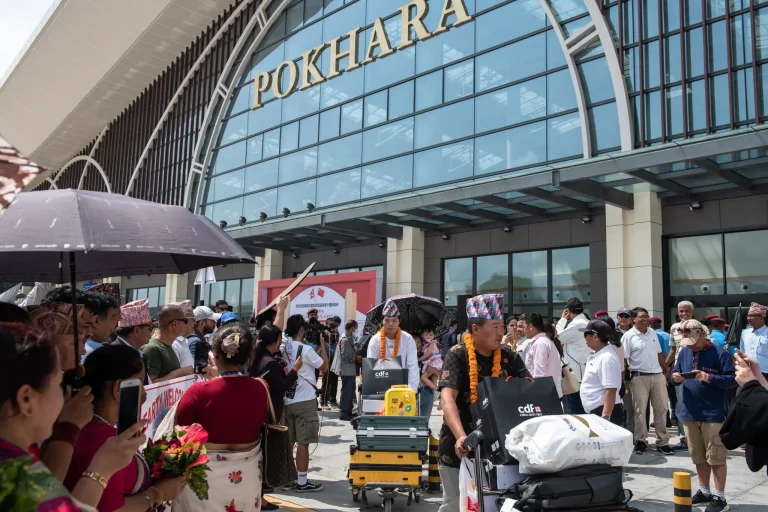A government investigation in Nepal has uncovered major corruption in the $216 million Pokhara International Airport project, built by a Chinese company. The airport, located in Nepal’s second-largest city, was found to have severe irregularities, with lawmakers and officials accused of ignoring poor-quality work and unpaid taxes.
Pokhara Airport Project Plagued by Corruption
The inquiry, led by an 11-member parliamentary committee, released a 36-page report on Thursday. It blamed officials and lawmakers for allowing China CAMC Engineering, a Chinese state-owned firm, to sidestep its obligations. The company allegedly charged for incomplete work and delivered substandard construction.
The airport, a major infrastructure project, was built with a 20-year loan from the Export-Import Bank of China. Opened in 2023, it was expected to boost tourism and improve international connectivity. However, it now operates only one international flight a week, far below expectations.
Details of the Report
The parliamentary report revealed several alarming issues:
-
Unfinished Work: CAMC failed to complete essential tasks, such as digging, refilling, and adding gravel to the runway.
-
Missing Facilities: The company was paid for facilities that were never built, including a fuel supply system and a heating, ventilation, and air-conditioning (HVAC) system.
-
Unpaid Taxes: Nepali authorities waived $16 million in taxes for CAMC, even though the contract required the company to pay customs duties and value-added tax (VAT) on imported equipment.
-
Runway Shortage: Although the contract called for two runways, only one is operational. The second remains closed for safety reasons.
International and Local Reactions
China had hailed the airport as a “flagship project” under its Belt and Road Initiative (BRI) — a global infrastructure plan launched by President Xi Jinping. The BRI has invested around $1 trillion in loans and projects worldwide.
Nepal, however, declined to officially label the airport as a BRI project. This decision was made to avoid straining diplomatic ties with India, Nepal’s close neighbor and key trading partner. India has yet to approve any international flights from Pokhara, limiting the airport’s use.
In 2023, The New York Times reported that CAMC inflated the project’s cost and ignored quality standards. Nepal’s Civil Aviation Authority, overseeing the project, reportedly avoided clashing with Beijing over this strategic venture.
Calls for Accountability
Rajendra Lingden, the parliamentary inquiry leader, described the situation as “a massive scale of corruption.” He called for the punishment of corrupt officials and politicians involved in the scandal.
“The corrupt bureaucrats and politicians involved in this scam must be punished,” Lingden said.
The parliamentary committee also demanded the immediate suspension of top officials at Nepal’s Civil Aviation Authority. This includes its current director general, amid concerns they might tamper with official documents related to the airport’s construction.
A spokesperson for the aviation authority declined to comment on the report’s findings. Meanwhile, China’s Ministry of Foreign Affairs and CAMC Engineering have not publicly responded.
Financial and Diplomatic Impact
The Pokhara airport has become a financial burden for Nepal. The country now faces the challenge of repaying the Chinese loan, originally meant to be covered by the airport’s income. With so few flights, this target seems out of reach.
In August 2023, then-Prime Minister K.P. Sharma Oli, known for his ties with Beijing, formally requested China to convert the loan into a grant. While Nepali officials showed optimism, no agreement was announced during Oli’s November meeting with President Xi Jinping.
The case highlights the risks of heavily borrowing from foreign lenders, especially for major infrastructure projects. As reported by Nepal Monitor, similar concerns have surfaced in other Chinese-backed ventures in the region.
What Happens Next?
The parliamentary report’s recommendations include:
-
Immediate suspension of aviation officials
-
Investigation into financial transactions between CAMC and government departments
-
Efforts to recover unpaid taxes and incomplete project funds
-
Transparent reviews of other foreign-funded projects in Nepal
As Nepal deals with the financial and political fallout, the Pokhara airport case serves as a warning about unchecked foreign influence and local mismanagement.


